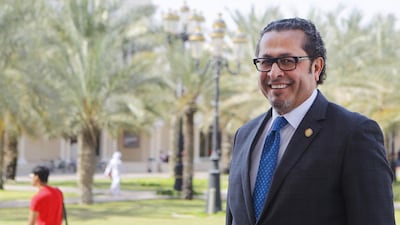SHARJAH // University staff are trying to break down the stigma attached to certain degree courses in an attempt to steer students towards subjects they are more suited to, rather than those that carry social prestige.
Students wishing to make early applications to degree courses with limited vacancies will soon be deciding what to study, but those choices for as many as 20 per cent of students will often be the wrong ones.
It has been well documented by academics that among Arab and Arabian Gulf families, in particular, parental influence over subject choice is key and parents still think engineering, architecture, medicine and business are the only subjects that will lead to a successful career with good salaries for their child.
“It’s critical to change this perception that one is defined by their major and to explain that true success will come when one does what one is good at,” said Kevin Mitchell, vice provost at the American University of Sharjah.
“It’s the first step on a long career path so it’s got to be something you’re going to be engaged with over the course of a lifetime.”
He said there was still a lack of awareness of other disciplines and where they can take a graduate, such as international relations, mass-media communications or multi-media design.
“It always comes back to ‘does it make you employable and what do you do with it?’ ” he said.
These preconceptions are outdated, Mr Mitchell said. Employers look for soft skills, such as writing and critical thinking, more than a particular subject of study, something that is reflected in numerous studies in recent years from major employers in the region.
Dr Emilie Rutledge from UAE University, a federal institution, is currently studying parental influence on degree and career choices among Emirati students. She said career guidance from secondary education through the early stages of higher education was key.
“The more flexible the structure of undergraduate degree courses, the more feasible it will be for students to actually reconsider their majors,” she said. “If such a structure was in place, they would be able to experiment with the subjects.”
Ali Shuhaimy, vice chancellor of admissions at AUS, said that parents see these areas of diversification but still prefer majors like engineering and architecture.
“You don’t see investment into projects for history or geography,” he said. “We see investment in nuclear energy, in solar energy.”
It is a culturally bound issue however.
“If you were in the US or Canada where there is a great history in higher education you will have many people studying a general major like history and when they graduate there are hundreds of organisations to employ them. But here, the only place that would consider hiring a history major is a school, where the compensation and status is deemed very low.”
Every year the university increases its outreach, educating prospective students and meeting parents. Last year the university held 170 functions and this year 220.
“With these realities or limitations we try our best with students to encourage them to do what they love,” Mr Shuhaimy said. “It works sometimes, but most of the time it doesn’t. Parental pressure and prestige is a huge cultural factor.”
Prof Samy Mahmoud, who resigned as chancellor of The University of Sharjah in January after six years, said that since 2009, a system has been in place to try to avoid the problems that arise when students do not choose wisely.
A high-tech guidance system helps students to envisage their career orientation and uses multiple-choice questions to help steer them to areas that match aptitude and personality. In addition, advisers from the university meet prospective students and their parents for in-depth conversations.
“Once the students are admitted and get into the first three weeks of classes, any student who shows doubts about their choice can meet one of the counsellors and ask for a transfer to another programme,” Prof Mahmoud said. “In addition, the student’s classwork is monitored carefully for the first few months for possible remedial courses of action.
“With the above system in place, fewer students find themselves in the wrong programme than was previously the case. We found in recent times that the percentage dropped closer to 5 per cent, which is practical for most universities around the world that are known to have the best advising practices.”
mswan@thenational.ae

